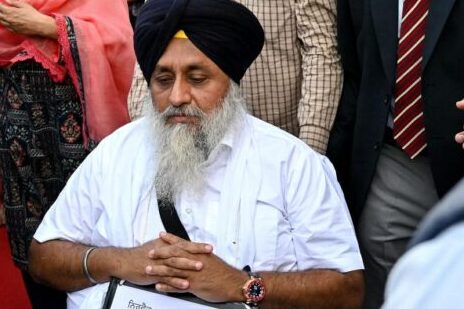As India’s second oldest political party, the Shiromani Akali Dal (SAD), grapples with an urgent struggle for survival in the political landscape, a situation of immense political importance has occurred in the north Indian state of Punjab.

The thwarted assassination plot against former Punjab Deputy Chief Minister and SAD chief Sukhbir Singh Badal is a stark indicator of the escalating radical extremism sentiments in the region. This incident can significantly and potentially disrupt the political dynamics in Punjab.
Separatist Elements Gain Momentum in Punjab
Separatist elements and voices have gained significant momentum after the farmers’ protests, a nationwide movement dominated by agriculture from Punjab. This development, which has shaped Punjab’s political landscape, resulted from the demonstrations providing a platform for radical voices to gain traction.
A foiled assassination attempt on former Punjab Deputy Chief Minister Sukhveer Singh Badal highlights the alarming and growing influence of pro-Khalistan extremism in Punjab, posing a significant threat to political stability.
Fuelled by online propaganda and Pakistan’s support, radical groups exploit social media and the Sikh diaspora to gain traction, threatening moderate voices.
The attack on the Shiromani Akali Dal chief has scrutinized the ruling Aam Adami Party Government in Punjab and presented it with a significant political challenge, particularly in terms of maintaining law and order and addressing the rise of radical elements in the state’s politics.
The AAP leaders claimed a big mishap was averted but did not utter even a single word on the failure of the corps in whose presence the bullet was fired.
Hardliner Khalistani groups have significantly impacted the performance of the Akali Dal in the general elections, particularly in Faridkot and Khadur Sahib, underscoring the influence of radical elements in shaping the political landscape.
The senior Akali Dal leader Sukhbir Singh Badal is currently undergoing a religious punishment called Tankhaia at the most prominent Sikh shrine, Golden Temple Complex. He was wearing the dress of a religious Sikh but was also seen hanging a placard on his neck, which hinted towards the atonement.
A foiled assassination attempt on former Punjab Deputy Chief Minister and Shiromani Akali Dal chief Sukhbir Singh Badal points towards the attempts to fuel the radical extremism sentiments.
Separatist elements and voices seem to have gained momentum in the wake of farmers’ protests dominated by agriculture from Punjab.
A foiled assassination attempt on former Punjab Deputy Chief Minister Sukhveer Singh Badal highlights the growing influence of pro-Khalistan extremism in Punjab. Fuelled by online propaganda and Pakistan’s support, radical groups exploit social media and the Sikh diaspora to gain traction, threatening moderate voices.
The attack on the Shiromani Akali Dal chief has also put the ruling Aam Adami Party Government in Punjab in the dock.
The AAP leaders claimed a big mishap was averted but did not utter even a single word on the failure of the corps in whose presence the bullet was fired.
Hardliner Khalistani groups also dented ceremony Akali Dal in the general elections at least on two seats in Faridkot and Khadur Sahib\
The Shiromani Akali Dal (SAD) is grappling with a significant leadership and credibility crisis. Sukhbir Singh Badal, who led the party for 16 years, recently stepped down as president following pressure from internal factions and the Sikh clergy.
This comes after the Akal Takht, the supreme authority in Sikhism, declared him guilty of religious misconduct related to controversies during his tenure. These include the 2015 sacrilege incidents and his decisions to pardon controversial figures like Dera Sacha Sauda’s leader, which alienated the Sikh community.
The party also struggles with internal dissent and factionalism, compounded by its diminished influence in Punjab’s political landscape. It has lost significant ground to rivals like the Aam Aadmi Party (AAP) and the Congress.
Adding to its woes, the Akal Takht has directed the party to reorganize within six months, with new leadership expected to emerge. Meanwhile, a panel of senior figures has been tasked with rebuilding the party’s structure and image.
The Shiromani Akali Dal (SAD), one of Punjab’s oldest political parties, is in a severe crisis under Sukhbir Singh Badal’s leadership. The challenges, which include internal dissent, declining political influence, and external pressures from the rise of radical elements in Sikh politics, are urgent and demand immediate attention.
Key Issues which added to the woes of Akali Dal
Many senior leaders, including prominent figures such as Jagir Kaur and Sukhdev Singh Dhindsa, have openly criticized Sukhbir Badal’s leadership. This has led to calls for his resignation and the formation of committees to identify new leadership.
A directive from the Sikh clergy at the Akal Takht has added pressure on Badal, demanding a change in leadership due to perceived mishandling of party affairs and allegations of religious misconduct.
The SAD has lost significant ground to rivals like the Aam Aadmi Party (AAP) and the Congress. This decline has been attributed to controversial decisions during its governance, such as the 2015 sacrilege incidents and controversial pardons, which alienated the party’s traditional voter base.
The death of Parkash Singh Badal, the party’s long-time leader, has left a void that Sukhbir Badal has struggled to fill. The party’s image has also been damaged by factionalism and dissatisfaction among key members.
The rise of hardliner leaders like Amritpal Singh has further fragmented the party’s traditional support base, complicating efforts to rebuild its influence.
The SAD’s ability to navigate this turbulent period crucially depends on the unity of its members, resolving internal conflicts, addressing its diminished credibility, and finding new leadership to restore its political standing. The upcoming leadership elections and organizational reforms will be pivotal for its future.
